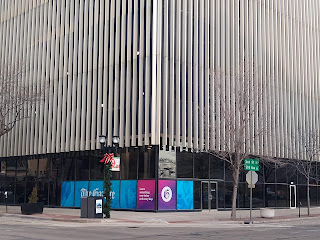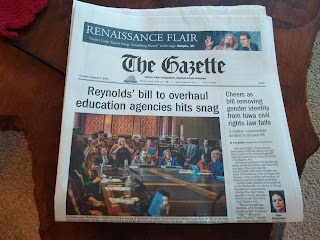 |
| The Gazette recently moved into the US Bank building |
Ten years ago this month, Chuck Peters, then publisher of the Cedar Rapids Gazette, spoke at Coe College about the future of journalism. He noted that the flood of data available on the Internet meant that news media no longer had a monopoly on information, and that this required some reinvention. He argued that newspapers in particular could facilitate "authentic communications... about things that matter" to the community it serves. His specific brainchild, a section titled We Create Here, lasted a short while, but the Gazette's efforts in that direction continue today with the annual Iowa Ideas Conference, Business Breakfasts on topical issues (one is happening next week on the subject of housing development), and a periodic panel of political columnists called Pints and Politics.
Reports have long been dire throughout the world of news media, but seem to be getting even more dire (Grynbaum et al 2024, Fischer 2024). Large operations--the Los Angeles Times, National Public Radio, the Washington Post--are making massive staff cuts. Corporate overlords that depended on, say, movie tickets to fund journalism, are slashing journalistic budgets when the tickets aren't getting sold. Cable news viewership is dropping; things are so bad that even the looming omnipresence of Donald Trump can't hold people's interest. But it's worst at the humble local level, where in contrast to feeling helpless about Trump and Gaza and Ukraine we should be feeling some efficacy; a widely-touted datum estimates five local newspapers shut down every two weeks. That doesn't count the ones that go from daily to once or twice weekly editions.
Jane and I still get daily delivery of the print edition of the Gazette, and I can remember when the New York Times printed transcripts of major public speeches, or when the Sunday paper had the list of baseball statistics throughout the season. A lot of institutions we grew up with, including churches, libraries, and four-year colleges, are struggling with identity crises as well, as revenues and audiences and respect dry up, while new generations find they can get along fine without relying on them.
Or can they? The disappearance of local media outlets removes a critical counterweight to local government officials, not to mention a way for people of all ages to learn about the community in which they live. As you are doubtless aware, national politics gets a lot more attention from everyone, but local politics has the most direct impact on our day-to-day lives. From small towns to big cities, decisions are being made about our future, but who is there to bring the discussions out of the conference rooms? Who has the credibility to question local power-brokers in an independent, informed way? Who can show a mirror to the community itself? Newspapers and other local media often fall short of the mark--it took the Gazette what seemed like forever to acknowledge climate change--but I don't think Reddit or City Council commenters can fill this role.
 |
| Perry Bacon Jr (from washingtonpost.com) |
Perry Bacon, late of 538 and now a columnist with the Washington Post, argues that news organizations should go all in on their public service function, as they are forced to turn to foundation and individual donations to replace lost (maybe forever) advertising revenue. Given "the major crises in America," news media should focus on three major areas:
Government and policy news, particularly at the local and state levels; watchdog journalism that closely scrutinizes powerful individuals, companies and political leaders; and cultural coverage, from important books and movies to faith and spirituality. (Bacon 2024)
Football and celebrity gossip are fine, too, if they help to pay the bills, but local news should focus on helping people access information they need to function in community.
Ownership is another issue. It should be local not national, for obvious reasons, and have an independent voice. I haven't noticed changes in content of the Washington Post since Jeff Bezos bought it, but a billionaire with an agenda (Rupert Murdoch? The guy who's buying the Baltimore Sun?) can do more harm than good. The local paper can, and in some cases has, become a tool of conservative insurgency instead of a means of unpacking/critiquing it.
 |




The death of the Newseum in Washington DC confirms this story. Where once front pages from 50 local newspapers - one per state - filled glass cases outside the museum, they disappeared one by one till the museum itself folded. It was my favorite museum of all.
ReplyDelete